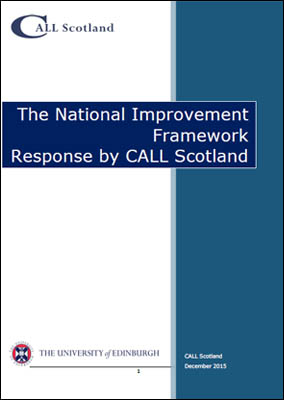Details
24 page PDF report - published 2015
Description
CALL Scotland's response to the draft National Improvement Framework. The response is in two sections. Under General Comments we consider matters of policy that relate to inclusion of learners who are either disabled or have additional support needs in the assessment process. We use this opportunity to introduce a different kind of language: one that we hope will encourage fresh ways of thinking about an often difficult subject. The following section, Specific Comments, provides more technical detail on potential specification criteria that will need to be in place to meet legal requirements on accessibility.
Our comments are limited to the topic of assessment. We understand that this is only one of the six drivers for improvement (embracing school improvement, school leadership, teacher professionalism, assessment of children's progress, parental involvement, performance information). Nonetheless, assessment is central to understanding whether and how the other drivers are acting to improve outcomes: a) 'parental involvement' cannot be enforced through statutory requirements and can only remain an input or activity measure ; b) performance information is identified as drawing on assessment of pupil progress; c) school improvement will include reporting on attainment; d) as will school leadership; e) teacher professionalism will require judgements about children's progress, and will draw on evidence including the results of national assessment that will be used to lead and drive improvement and to support teachers to close the gap in attainment.
The proposed standardised assessments will be considered and designed in the context of Equality and Accessibility legislation. We would also urge Scottish Government to consider the implications of emerging international policy and practice, in particular from the USA (Universal Design for Learning1) and from the European Union2 3. In doing so, we would encourage consideration of how a new language of intervention might play its part in developing agreements from all stakeholders on the positive intentions behind this policy. We will develop these ideas in this paper.



Our social media sites - YouTube, Twitter and Facebook